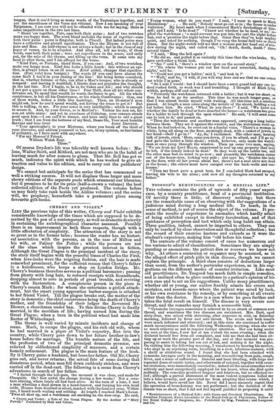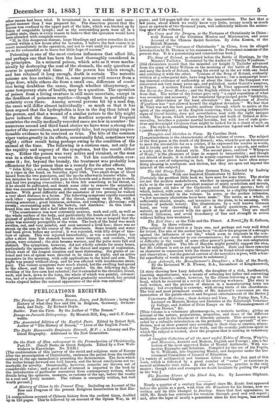TOOGOODIS REMINISCENCES OF A MEDICAL LIFE. * THIS volume contains the
pith of upwards of fifty years' experi- ence, by a country practitioner, head of a provincial institution.
Of novelty there is little, of discovery nothing; but there are the remarkable cases of an observing with the.suggestiona of a judicious mind during a long medical life. To teach, in the sense of method, is not of course the object of the volume. It pre- sents the results of experience in anomalies which hardly admit of being exhibited except in desultory lucubration, and of that quickness of perception and tact which only long habit can attain. These qualities; indeed, cannot be imparted to others. They can only be reached by close observation and thoughtful reflection ; but the record of their exercise hastens and extends as it were the student's experience, making him "old before his time." The contents of the volume consist of cases too numerous and too various to admit of classification. Sometimes they are simply puzzling or anomalous; the patient dies or recovers we know not why. At others a connexion or sequqnce may be assumed, as in the alleged effect of pitch pills in skin disease, though we cannot explain the principle. A. third class consists of deductions larger than usual, from the author's particular experience, as in his sug- gestions on the different modes of counter-irritation. Like most old practitioners, Dr. Toogood has much faith in simple remedies, and is inclined often to place confidence in a patient's opinion of his own case and to act on his suggestions. Unlike many practitioners, whether old or young, our author frankly admits his errors and mistakes, and records cases where the patient was saved by luck, or his own resistance to the remedy, or by something at all events other than the doctor. Here is a case where he goes further and takes the fatal result on himself. The disease is very severe sore throat, and the remarks may furnish a seasonable hint.
" Cynanche laryngea sometimes is ushered in by an attack of common sore throat, and sometimes the two diseases are coexistent. Mrs. Burt, aged sixty-four, was seized with shivering, after exposure to cold, on Saturday morning, followed by fever and sore throat. The uvula and both tonsils were much inflamed and ulcerated ; and in this state she continued to suffer much inconvenience until the following Wednesday morning, when she was so much relieved as not to require further attention. Her son being under my care at the time, I saw her at ten o'clock the same evening ; when She declared herself free from all complaint, and told me that she had been sit- ting up at work the greater part of the day, and at that moment was pre- paring to assist in taking her son out of bed, and making it for the night. On visiting him the following morning, I was alarmed by hearing his mother, who slept in an adjoining room, breathing in a slow, laborious manner, with a shrill or stridulous sound. I found that she had been attacked with cynanche larynges early in the morning, and was suffering from pain, cough, fever, and a sense of suffocation. General and local bleeding, with large and repeated doses of emetic tartar, and afterwards of calomel, together with coun- ter-irritation, were immediately resorted to; indeed all the usual remedies were actively and most energetically employed for ten hours, when she died quite suddenly. The remedies produced languor and faintness, but no effectual re- lief; although a partial abatement of the most violent symptoms lulled me into a false security, and prevented me from adopting that course which, I believe, would have saved her life. Never did I more sincerely regret that the operation of bronchotomy was not performed ; but the duration of the disease was so short, that I did not feel myself justified in proposing it until • Reminiscences of a Medical Life; with Cases and Practical Illustrations. By Jonathan Toogood, Extra Licentiate of the Royal College of Physicians, Fellow of the Royal College of Surgeons, 8re. Published by Mai, Taunton; and Longman and Co. other means had been tried. It terminated in a more sudden and unex- pected manner than I was prepared for. The dissection proved that the disease was confined to the upper part of the tube, which was blocked up by flakes of coagulable lymph; and as the surrounding parts were all in a healthy state, there is every reason to believe that the operation would have been attended with complete success.
"If, in this dangerous disease, large bleedings and active remedies do not succeed within a few hours after its invasion, I believe the best course is to resort immediately to the operation, and not to wait until the powers of life are so far exhausted as to leave but little hope of success."
Poisoning is one of the most curious influences that affect life, and perhaps one that has been the least thoroughly considered in its principles. In a mineral poison, which acts as it were mecha- nically by destroying the coat of the stomach, the only question of course is quantity and time. If the person has taken enough, and has retained it long enough, death is certain The narcotic poisons are less certain; that is, some persons will recover from a large dose, while others die from a small one, difference of condi- tion being doubtless the cause, though whether idiosyneracy, or some temporary state of health, may be a question. The operation of poison from a living creature is still more uncertain, except in the deadliest of poisonous reptiles—though there is probably un- certainty even there. Among several persons bit by a mad dog, the cases will differ almost individually : so much so that it has been argued that the hydrophobia is less in the dog than latent in the person, and that a wound of a similar nature to the bite might have induced the disease. Of the deadlier serpents of Tropical countries the really medically recorded cases are few in number : the numerous second and third hand stories we have wear a strong cha- racter of the marvellous, not necessarily false, but requiring unques- tionable evidence to be received as true. The bite of the common viper varies greatly in its effects, occasionally fatal, sometimes very slight ; either result being perhaps owing to the condition of the animal at the time. The following is a curious case, not only for the rapidity and urgency of the symptoms, but the result either way. Either the poison was very active and virulent, or the man was in a state disposed to receive it. Yet his constitution over- came it ; for, beyond the brandy, the treatment was probably less efficacious for the poison than as a remedy for its after effects. " John Kibly, a strong, healthy man, aged forty-seven years, was bitten by a viper in the hand, on Saturday April 18th. Two small drops of blood issued from the two punctures, and the specks afterwards became white. In ten minutes he was seized with pain in his bowels and a desire to go to stool, and had two purging evacuations ; be then felt something in his throat, as if he should be suffocated, and drank some cider to remove the sensation ; this was succeeded by hoarseness, sickness, and copious vomiting of bilious matter. With great difficulty and the assistance of two persons he walked a very short distance to a house. The following symptoms rapidly succeeded each other : spasmodic affection of the throat, coming on by fits., with a chokingsensation ; great faintness, sickness, and vomiting ; shivering; cold sweats ; excruciating pain in the bowels, and diarrhoea. In this state I found him one hour and a half after the accident.
"The countenance was now extremely anxious, sunk and cold, as well as the whole surface of the body, and particularly the hands and feet ; he com- plained of giddiness in the head, and the circulation was so languid that the pulse was scarcely perceptible at the wrist. The back of the hand was much swollen, red, and very painful, and soon assumed a livid hue ; there was no streak up the arm in the course of the absorbents. Some brandy and water had been given before my arrival ; it was repeated, with fifty drops of tinc- ture of opium. This was rejected immediately, as was a second dose ; but after a abort time the stomach became more tranquil, and cordials, with opium, were retained ; the skin became warmer, and the pulse more full and distinct. The symptoms, however, did not wholly subside for many hours, particularly the spasmodic affection of the throat and organs of respiration, which were of the longest duration and most distressing. Six grains of ca- lomel and two of opium were directed to be taken at night, and an active purgative in the morning, with cold applications to the hand and arm. The night was passed without sleep, and he was affected with troublesome stran- gury. The violent symptoms were much abated, but the swelling had spread to the elbow, and the limb was very painful. On the following day, the swelling of the fore-arm had subsided ; but it extended to the shoulder, breast, neck, and back, down to the loins, the whole of which was painful, oedemat- ous, and of a mulberry colour. The patient gradually recovered, but several weeks elapsed before the natural appearance of the skin was restored."



































 Previous page
Previous page